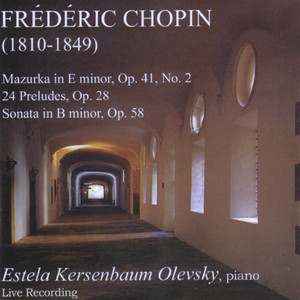
Frédéric Chopin (弗雷德里克·肖邦)
- 歌唱: Estela Kersenbaum Olevsky
- 发行时间:2012-02-07
- 译名:弗雷德里克·肖邦
- 类型:录音室专辑
- 歌曲
- 时长
-
作曲家:Frédéric Chopin( 弗里德里克·弗朗索瓦·肖邦)
-
作品集:Mazurka in E Minor, Op. 41
-
作品集:Preludes, Op. 28
-
作品集:Preludes Op. 28
-
作品集:Preludes, Op. 28
-
作品集:Preludes Op. 28
-
作品集:Preludes, Op. 28
-
作品集:Preludes Op. 28
-
作品集:Preludes, Op. 28
-
作品集:Sonata No. 3 in B Minor, Op. 58
简介
ABOUT THIS CD This concert was recorded at Bezanson Recital Hall at the University of Massachusetts on November 9. 1999. Of this performance, Clifton J. Noble of the Springfield (Massachusetts) Union News wrote: "... an evening of pure poetry...from the feathery opening chord of the E minor Mazurka. Op.4l, No.2 to the three apocalyptic strokes of the low D that mark the end of the cycle of Preludes, Estela Kersenbaum Olevsky transported her listeners into a private world, intimate and touching. With deeply felt sensitivity, she guided us through the interstices of Chopin's genius, by turns searing and playful, tormented and tender. At the peak of her expressive powers, Olevsky painted a tone picture of a youthful creative force burning with white heat, translating Chopin's fiercely passionate experience of life into preciously crafted miniatures of evanescent but arresting emotion." ABOUT THE MUSIC The Mazurka Op.4l, No2 and the Twenty Four Preludes, Op. 28 were completed in the winter of 1838-1839 in Majorca where Chopin spent a turbulent three months early in his relationship with the French novelist George Sand and her two teen-age children, Maurice and Solange. The Mazurka in E minor (written in the city of Palma) is a true gem of poignant sadness. The Preludes were composed at the Carthusian Monastery of Valdemossa. They are modeled after J.S. Bach’s 48 Preludes in that they are organized according to a consistent scheme of tonalities. Chopin's 24 Preludes follow a major-relative minor pattern progressing around a circle of fifths from C to F. However, when performed as a set they seem to create a new dimension of dramatic tensions and releases that result in a new larger unification of this work. In the Story of My Life George Sand writes: "masterpieces...the short pieces he modestly titled preludes. Many of them bring thoughts and visions of suffering monks...and of funeral chants that besieged him; others are melancholic and suave. They came to him during hours of sun and health...still others are of gentle sadness, which, while charming your ear, break your heart." The Sonata in B minor, Op.58 was composed in Paris seven years later (1845). It reflects some of the same mercurial qualities but with a much broader musical scope than the Preludes. It evolves from a noble Allegro maestoso through a whispery Scherzo and a languid Largo into a wild ride that culminates in an avalanche of sound in the Finale. This Sonata is perhaps one of the most perfect examples of the romantic spirit embodied in an expanded classical sonata form.



